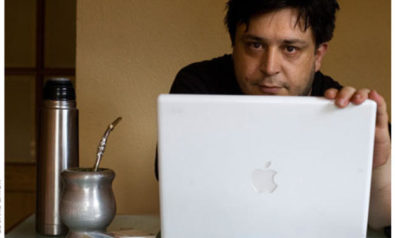Julián Chappa speaks to Enrique Murillo about his time in London, FC Barcelona, and the world of book publishing.
Julián Chappa: You are an editor, journalist, translator, and writer. Which one did you become first?
Enrique Murillo: I began as a journalist, without any vocation for that job, but I found it quite interesting because I was able to interview writers and people from the arts. At the same time, I was a screen writer for independent movies, and I was secretly writing. That was in my early twenties.
Chappa: What can you tell us about your experience at the Birbeck College, University of London? How did you find returning to a Francoist Spain after your time in England?
Murillo: In 1969, I was hired by the BBC for their Spanish program, and London became my home for some six or seven years. A friend introduced me to the head of the Spanish Department of Birbeck College, and after a long conversation he asked me to produce a short essay on Pablo Neruda, one of the poets we had discussed. After reading it, he invited me to start a Ph.D. I warned him about my lack of preparation for that degree – I didn’t even have a BA, just a three-year stint in journalism, which did not amount to much. He couldn’t care less about formalities. London (in those pre-Thatcher years) was like this – a paradise for someone from a fascist country controled by an old dictator, his police force and the ultra-conservative Catholic Church. It took seven years to finish that thesis, and I ended it back in Barcelona. In fact, I was forced to go back because of the power of the Church, which did not allow for divorce laws. Trying to save my relationship with my children after the separation, I lost a good job and left a nice city. But then, after Franco’s death, some hope arose in Spain. Only, I couldn't find a decent job for a long time. And this is how I became a translator.
Chappa: You were the first ever editor of El Pais’ Babelia supplement. Were those the supplement’s best years? What was cultural journalism like during that time? What changed?
Murillo: I started by being the editor of the books suplement, Libros, and simultaneously preparing the future arts and books supplement, which I wanted to call Babel — not the ugly name it was finally given. I had been working with writers like Javier Marías or Martin Amis, for years, at Anagrama. So it was easy to convince many of them to review for Babelia. Our covers looked very much like those of the New York Review of Books, and it was fun for a while to create a serious cultural supplement. But the internal wars in the newspaper were awful. I couldn’t stand an editor-in-chief who protested because I had given our cover story to “a scandalous book” — American Psycho! I was, again, ready to change to any other kind of job.
Chappa: Which Spanish editors did you look up to during that time, and why?
Murillo: Carlos Barral was a real publisher, editor, and writer. I worked for him for a few months before leaving Barcelona for London. There’s been no one since him with such talent. He loved poetry and non-fiction, but discovered Maria Vargas Llosa and Juan Marsé, even though he underestimated fiction. Jorge de Herralde, who was rich thanks to having inherited from his father, a big guy in the industrial world, had the genius to start publishing fiction when, in the late 70s, novels were supposed to be (for the left wingers, at least) mere entertainment for women and queers. But he learned fast from his English, French, and Italian colleagues, all of whom, however left wing, published fiction.
Chappa: Did any books impact the way in which you create and understand literature?
Murillo: Henry James. I translated a few of his 1890s novellas into Spanish. I then stopped writing poetry because I thought — well, perhaps I could try to imitate this in Spanish. In the vein of James’s “The Figure in the Carpet” and other writers’ stories by James, I found a fiction voice and used it for El Secreto del Arte, a collection of novellas published in 1984. Then, I translated a few books by Vladimir Nabokov, and under his spell I wrote El Centro del Mundo, my first novel. Peter Handke’s shadow can be perceived in my next book, Qué Nos Pasa, even though I mixed a very realistic beginning, with a rather expressionist ending. In my last novel to date, La Muerte Pegada a Las Uñas, I am no longer conscious of any special influence, so it probably has a mix of all of them.
Chappa: I am sure that you have experienced many interesting, behind-the-scenes events throughout your career as a succesful editor. I am sure that you sharing a few of these anecdotes would satisfy many readers and it would, undoubtedly, affect some big names in the publishing world. Have you ever considered using this “brutal honesty” for the good of a generation of readers who think that you know firsthand?
Murillo: I wrote a short prologue and a first chapter (my relationship with Barral) of my memoirs. Working almost alone as a publisher for the last five years doesn’t seem to allow for any writing nowadays. Perhaps when I retire. I never took any notes, no time for that. I remember, however, lots of things. Mostly preposterous. If am in the vein, I will probably write a comedy thing, if I ever do.
Chappa: Please tell us how Los Libros del Lince, the independent publishing house that you founded in 2008, began. It is obvious that this endeavour has allowed you to be yourself, to use your amazing intuition and to see potential where others do not.
Murillo: I have been fired (never being able to accept silently the horrors I have experienced) from all the big groups I worked with. After Alfaguara, I decided to have fun and wrote with one of my brothers a book of interviews with Ronaldinho, Xavi Hernández, all the good soccer players who made FC Barcelona (my club since I was four) great, all of a sudden. I interviewed members of the group of millionaires who were running the club.
I mentioned my plan to start a small publishing house to one of them. He got friends to put some money together, along with myself (I invested the money I got as an advance for the book), and we founded Leqtor. Just six months later, it was obvious we were having disagreements all the time. I published a book against nuclear power, and the football moguls were in favour of that kind of energy. One of them wanted to be the editor-in-chief, and used one of his trips to the US to have dinner with an American essayist and told her that he wanted to comission her a book about religion as the main influence in the rich cities of the East Coast, which he thought was a great publishing idea. She mentioned how much she was getting from her publishers in the US (“even though I don’t sell a lot, they pay me this figure”, she said), and rejected the project. She wasn't interested, and couldn’t understand who could be. I was not able to work with the kind of people who put the money for that company. And finally, they decided to fire me. So I had to start again, choosing better partners. That happenned at the end of 2007. The new company, called Los Libros del Lince, had very poor shareholders, including myself. We had no money, but we shared an idea — we wanted to publish new voices, serious writers. Our first book, Raj Patel’s Stuffed and Starved, was published in March 2008. We have survived now for five years.
Chappa: Do you think that new technologies facilitate the emergence of an alternative editorial world?
Murillo: I am not very interested in that. I am interested in what the books say, and don't care a lot about the technologies. I love paper books. And I print many times as little as 1,000 copies, and I can still make business with that. I mean, I am not forced to close down. Good books will always find 800 readers, even in a country that has a four centuries tradition of book hating. And if you sell 800, you do not lose money. So if you get a book that you reprint, this will pay for two that sell less than one thousand.
Chappa: Will the Internet save or erradicate the publishing model which we know and use today?
Murillo: Things will change at both ends of the business. They are already changing. The problem is for the big ones. In Spain, they work with a standard 55% of returns, no less than that. This is madness. These companies usually lose money, despise writers, etc. It's not my business any longer, so I don’t care. They, from time to time, try to steal away my best authors, who systematically send them to hell. At the other end, the small publishers have possibilities. I have established Los Libros del Lince as a small company that publishes new writing — non-fiction that deconstructs the globalized world from points of view that have nothing to do with the orthodox left wing, and fiction from new writers who start publishing with me. They know that I will personally edit their text, and work even a whole year with them if necessary, until the manuscript is ready. So new and very good writers come to me with their manuscripts all the time. Pity, I can only publish six or seven books a year. It’s fun, and it’s profitable, and someone has to do this job.
Chappa: To conclude, what do you see in the eyes of young authors who give you their manuscripts? What differences do you see between them and you at their age?
Murillo: There is no difference. I was shy, and they are shy. I was, at the same time, convinced that I had something to say, and they are too. Seeing them grow as writers and not become worse people even after success, is something I really love. Right now, while my latest discovery (Javier López Menacho, whose book — Yo, Precario — is in its third edition, only three months after first printing) is giving a couple of interviews a day because he has given voice (and what a voice) to the five million of under-30 Spaniards with no job, or with extremely precarious jobs being paid with six or seven months delays, sometimes only four euros per hour.
I am talking to another young guy whose book is brilliant from the title — Let’s Destroy Spain (Before Spain Destroys Us All) — to the last page. He was sure he had written a good book, but he was shy at sending the manuscript to me. We are going to work for two, three months, and he will publish his first book in 2014, and he and Javier López Menacho, will be very well known in no time.
Marina Perezagua, whose first book of short stories I published two years ago, has produced a second, brilliant and already mature book, out now in Spain, and this new collection, Leche, has already obtained beautiful reviews.
You know, I have the best job in the world!
*[This article was translated from Spanish to English by Yessi Bello Perez.]
The views expressed in this article are the author's own and do not necessarily reflect Fair Observer’s editorial policy.
Image: Copyright © Shutterstock. All Rights Reserved
Support Fair Observer
We rely on your support for our independence, diversity and quality.
For more than 10 years, Fair Observer has been free, fair and independent. No billionaire owns us, no advertisers control us. We are a reader-supported nonprofit. Unlike many other publications, we keep our content free for readers regardless of where they live or whether they can afford to pay. We have no paywalls and no ads.
In the post-truth era of fake news, echo chambers and filter bubbles, we publish a plurality of perspectives from around the world. Anyone can publish with us, but everyone goes through a rigorous editorial process. So, you get fact-checked, well-reasoned content instead of noise.
We publish 2,500+ voices from 90+ countries. We also conduct education and training programs
on subjects ranging from digital media and journalism to writing and critical thinking. This
doesn’t come cheap. Servers, editors, trainers and web developers cost
money.
Please consider supporting us on a regular basis as a recurring donor or a
sustaining member.
Will you support FO’s journalism?
We rely on your support for our independence, diversity and quality.












Comment